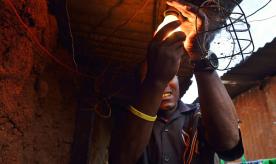Resilience to economic shocks through continued electricity access
As COVID-19 spreads across the developing world, access to electricity will be critical in allowing households and firms to continue productive activities. At the same time, government restrictions that are needed to slow down the infection rate will cause severe economic impacts, which will be highest in the world’s poorest communities. In Kenya, where millions of poor households were only recently connected to the grid, we expect severe disruptions in the ability of people to afford ongoing electricity consumption. We propose providing emergency “lifeline” electricity credits to poor, rural, and randomly-selected households, in order to identify the impacts of policies aimed at subsidising utility bills in response to an economic crisis.
Our high frequency data collection, combined with the lifeline electricity assistance will allow us to give rapid feedback to government partners in Kenya about the impact and value of these subsidies, which could shape public policy in this space: numerous governments are considering subsidies on utilities during the crisis. This project will contribute to broader research seeking to understand the role of basic public services, including for example access to water, healthcare, and electricity, in improving resilience against economic and health shocks.
To study this issue cost-effectively, we will leverage two existing research projects on electricity access in Kenya. These projects include more than 1,000 individuals with pre-paid electricity meters and who live in seven counties in Kenya spanning more than 5,800 square miles. Due to the geographic coverage we will be able to monitor the spread of the epidemic (through self-reported symptoms) in conjunction with economic changes. In the longer term this project will allow for meaningful policy recommendations on how to improve households and firms resilience against economic crises.






